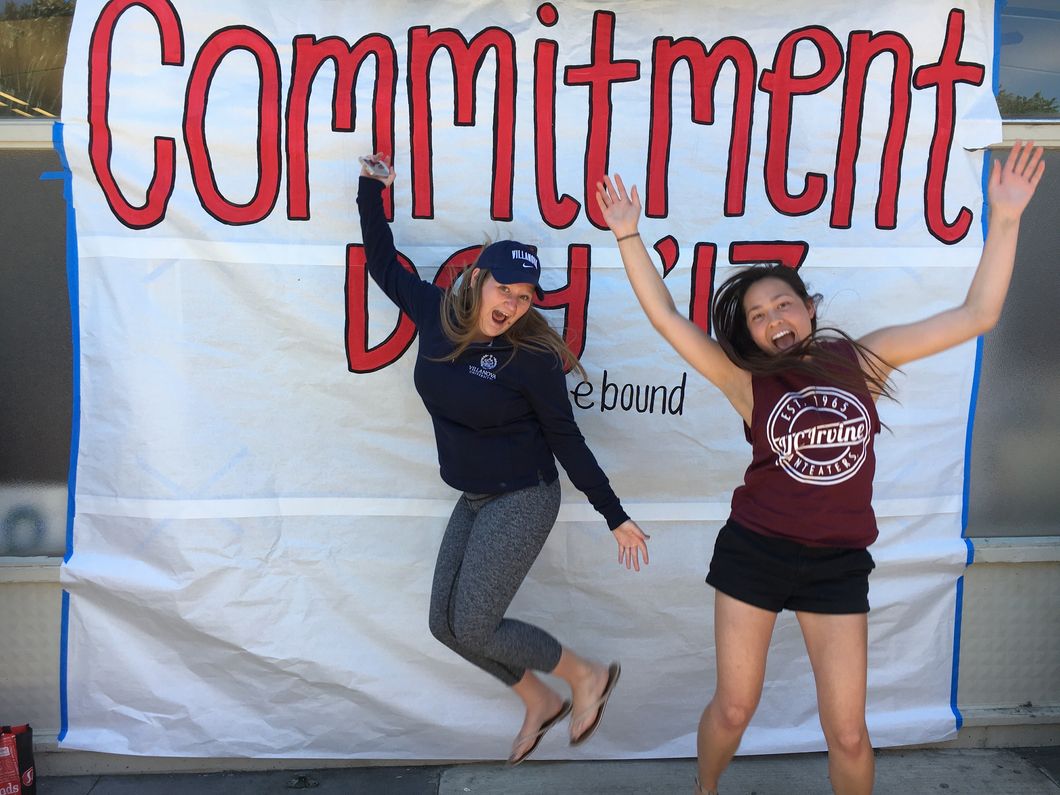Applying to college can be confusing. There are a lot of steps and it can be much more difficult and time consuming than one might think. After watching both of my older brothers go through the process, I was able to learn from their mistakes and successes. Today I am a sophomore at Villanova University and loving every moment it. Here's my timeline on how I applied and was accepted into college.
1. SAT/ACT

WHICH ONE?
I misconception by most parents and students is that you must take both. Although this may be true for some schools, most schools take one or the other (make sure to check that a specific school you want to apply to takes either or!) It is not necessary to take both. It's best to find out which type of test you will perform better on. I recommend taking a practice test of both and seeing which you scored better on and which you would be most likely to improve on. Although both tests aim to test students on similar subjects, they do so in different ways. The Princeton Review provides wonderful resources on which test may be best for you. Why try to master both tests when you can focus on doing you best on just one? I was best at the ACT and I never took the SAT.
WHEN?
It's important to take your first official SAT/ACT during the beginning/middle of you Junior year. This way, you'll have time to take it again later in the year after improving on the areas you could score better in. Both tests offer many dates throughout the academic year. Allow for some time to pass between each test you take, this way you can prepare for the next one in the appropriate amount of time.
HOW MANY?
I took the ACT 3 times. Once in January and April of Junior year and once in August of my Senior year. I HIGHLY recommend getting all of your test taking done BEFORE senior year. Having to study for the ACT during summer was awful to say the least. It's important to not over take a standardized test. If you find your self not improving after taking a test 4 times, you need to STOP. Most colleges require you to submit ALL your test scores, regardless if it's your best score or your worst score. Colleges want to see you improving on the tests, not taking them over and over again and hoping for a better score.
STUDYING?
SAT/ACT books can be very helpful. Look on Amazon or in a book store for test taking help. Almost all test prep books will have practice tests. These practice tests will be your best friend! They also have different strategies that will help you to use your time wisely. Make a study schedule leading up to your test and stick to it. Focus on specific sections and do the practice tests to make sure you understand how to plan out your official test! Allocate an hour or so everyday and this will help you master the test without burning out.
TUTORING?
Tutoring can be very helpful when taking standardized tests. Many companies provide tutoring for specific tests. I used 3 different tutoring options while taking the ACT. Before my first official exam, I was in a small group classroom setting learning from a college student 3 times a week for a month. This was a great introduction to the tests and how to strategize while covering topics I may not have learned while in school. Before my second exam, I had a one-on-one tutor to really hone in on the sections I was struggling with. Lastly, before my third test, I used all of the materials and notes I took from my other tutors and self-taught. At this point I knew all of the strategies and was more working on how to use my time wisely and apply the strategies. I did practice test after practice test and studied every day. The most important thing about tutoring is to find out what works best for your learning style. If you know you're better one-on-one, then do it. Use your time (and money) efficiently.
A NOTE ON SAT SUBJECT TESTS
A small group of universities require applicants to take SAT Subject tests. These are tests that solely cover one subject. There are various different subjects to choose from. ONLY take an SAT Subject test if you know for a fact, one of your schools requires it. This test is not needed unless the college specifies the need for this test on their admission website. Some schools require one, two, or three different subject schools. Do your research before signing up to take a test.
2. College Research/Application List
After taking your standardized tests, it's time to start researching schools! There are many online resources to help you see what schools might fit your priorities.
PRIORITIES
Big or small school? Small classes or huge lectures? Sports? Greek life? Study Abroad programs? In-state? Out of state? Work Study? Urban or Rural? It's important to figure out exactly what you want in a school. Knowing what you're looking for can be very helpful in the college search. If you don't where to start when finding out what you want in a school, I suggest touring a school near you. It doesn't have to be one that you want to go to, but seeing a college can help you figure out what you like and what you might not want in a college experience and education.
WHEN?
Start researching schools during the summer before your senior year. Go into senior year with a list of schools you want to apply to. If you're not completely sure that you will apply to these schools, at least you have an idea going into the hectic school year.
THE LIST
Compile the list of all the schools you're interested in. Find exactly what you need to apply to each of them and how. Make a spread sheet to keep track of what each school needs for the application. Include things like due dates, scores, essays, teacher recommendations, and what platform that school uses to submit the application.
HOW MANY?
I applied to 15 schools. Each of these applications require a lot of time, effort, and money. Be selective on which colleges you want to apply to. It's important to have 3 types of schools in your list: Safeties, Likelies, and Reaches. Safety schools are ones that you are most likely to get into. For a school to be a safety, you must have well over the average GPA/Test score. Likely schools are schools that have an average GPA/Test score that matches your current GPA/test score. It's is likely you will be admitted, but it could still be a toss up on whether you with be admitted. Reaches are schools that you are not as likely to get into. This may be your dream school or one you only recently were interested in. These schools have averages GPAs/test scores that are much higher than what you have. Whether you have one in each category, or three in each category, make sure you are giving yourself that best chance to be admitted to a school.
Have your final list and spread sheet made before September ends! Give yourself plenty of time to complete the actual applications and write the require essays.
3. Applications

Once you have your application list, start to work on the requirements for each school.
PLATFORMS
Each school has its own way of receiving applications (annoying right). Some schools may use a specific platform just for their school, while others may use a platform that many colleges use. For example, Georgetown University applications can ONLY be submitted through its website. Villanova University used the CommonApp, a website that many different universities like Boston College, Tulane University, and Harvard University also use. The University of California (UC) system uses its own special platform, different from the California State University (CSU) platform. Figure out which platforms you need to use and start working on them.
ESSAYS
A personal statement is required from almost ALL colleges. Whichever platform you are using will prompt you with what your personal statement should include or be about. Work on this ASAP! Make multiple drafts and edits. Get everyone and anyone to read it. Ask your teachers at school or parents, use whatever resources you may have. Be aware of additional essays. Some colleges require supplemental essays in addition to your personal statement. Most come with a prompt that can be found on the platform you are using or on their website. DO NOT wait until the last minute to write your essays. Find out which prompts you need to write about and get them done ASAP. If you have the chance, try and see if any of the prompts are similar. Why write 3 essays if you can write one and tweak it a bit to fit the other two! Think smarter not harder!
DUE DATES
Each application may have a different due date. Make sure you're turning in your application on time or EARLY. Get them over with!
4. The Other Stuff
Teacher Recommendations
Ask your teachers in ADVANCE for recommendations. Most teachers have A LOT of recommendations to write, so the earlier you ask, the better your letter will be. Try to give them a heads up at the end of Junior year, and remind them when you come back to school.
Extra Curriculars
Many applications ask for extracurriculars that you have been involved in. When choosing which ones to include, focus on ones that will highlight your commitment and possible leadership positions. How long you've been doing an activity or club and your leadership position in it, is exactly what colleges are looking for.
5. Submit

CELEBRATE!!!!!!!
Overall Timeline

This may have seemed like a daunting article, so here's a quick timeline to help sum it all up.
Early/Mid Junior Year:
Take your standardized tests 1-3 times.
Ask for teacher recommendations.
Summer:
Figure out your priorities. What do you want in a school?
Research Colleges.
Create your final list and spread sheet.
Create accounts for all of your application platforms.
Early Senior Year:
Know your due dates.
Write your personal statement. REVISE REVISE REVISE.
Work on your supplemental essays. REVISE.
Work on your applications.
SUBMIT applications EARLY.
Late March/Early April:
Check your email every day!
Apply for Financial Aid/Scholarships if needed!
Hear back from the schools you applied to!
Before May 1st:
Commit to your school and CELEBRATE!!!!



















